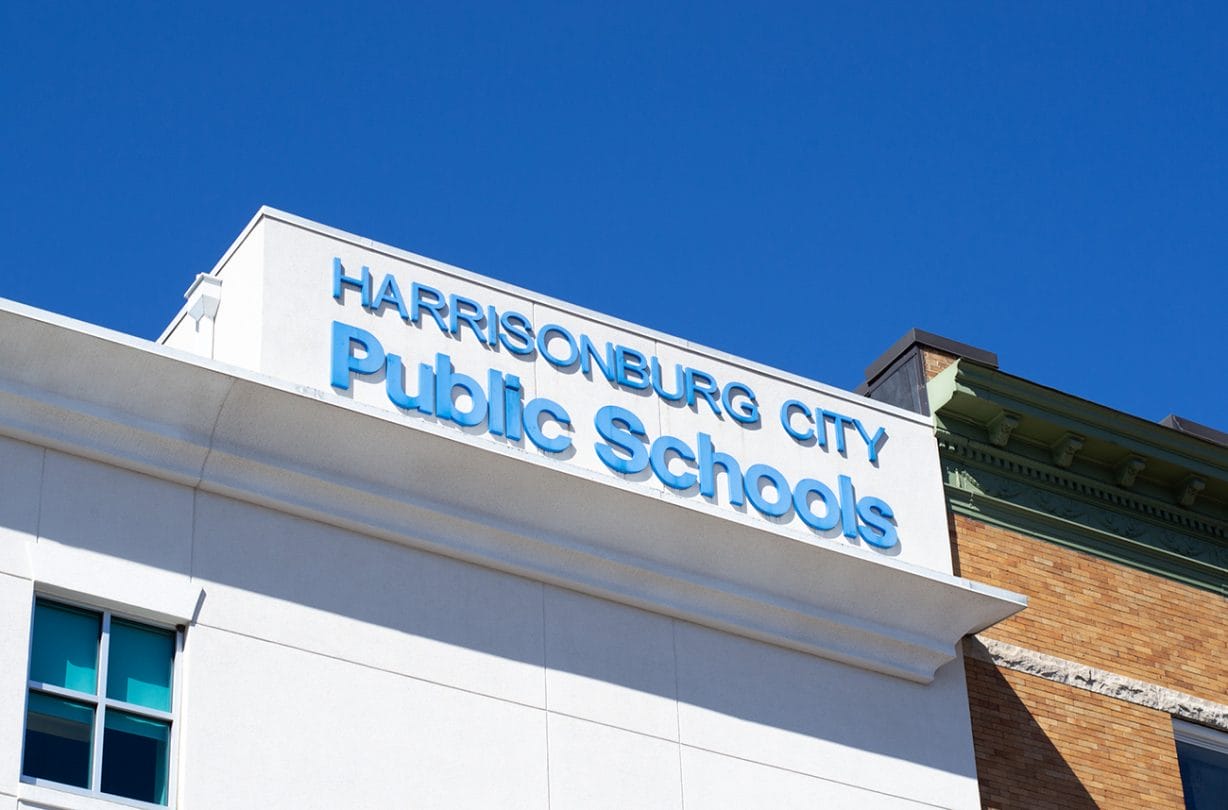By Randi B. Hagi, assistant editor
To open 2021, the Harrisonburg School Board selected Kristen Loflin as its new chairwoman and Nick Swayne as vice-chairman, then moved forward Tuesday with efforts to further define roles for school resource officers and to prevent harassment in schools, among other business.
The board established an ad hoc subcommittee to collect public input on school resource officers, or SROs. School board members Kaylene Seigle and Obie Hill volunteered to assist the division’s equity advisory council in putting together forums and surveys about whether police officers should be present in school buildings and, if so, what their roles should be.
In September, the board adopted a temporary contract with the Harrisonburg Police Department that expires at the end of this academic year, with the intent to hold public discussions before making a more permanent decision about whether to keep those officers in schools. Superintendent Michael Richards said on Tuesday that forums would probably be held during upcoming work sessions.
The school board also unanimously voted Loflin as the new board chairwoman and Swayne as vice-chairman for 2021. Loflin was first elected to the board in 2018 and Swayne won his fourth four-year term in the November election.
The board also established a committee for legislation that Swayne and School board member Deb Fitzgerald will serve on. That committee will “take legislative priorities to Richmond each year for the General Assembly session,” Richards said. The group will focus on preparing its first round of suggestions for the 2022 session.
Moving forward on harassment policy
The school board also conducted first readings of school policies on harassment and restraint of students. The policy, required by the federal Title IX law, prohibits harassment and retaliation by anyone on school property or at a school sponsored event, said Kelly Lineweaver, the division’s coordinator of policy and communication. Federal changes to Title IX required the school board to update the process for reporting in their policy.
School board member Andy Kohen asked that the school board add a clause prohibiting anti-semitic activities.
“The Anti-Defamation League and Southern Poverty Law Center document the enormous increase in such activities” over the past four years, Kohen said.
“Anything we can do towards greater inclusivity, we should definitely be doing that,” Loflin agreed.
Lineweaver said staff would check with legal counsel to ensure they could add this provision and bring the policy back to the school board to review again in a future meeting.
The school board also reviewed a newly written policy on the physical restraint of students when they pose a threat of injury to themselves or others.
Lineweaver said “this is not a new procedure or a new practice for us,” but every division in Virginia must have an explicit policy to comply with the Virginia Board of Education’s regulations.
Richards said staff are trained in the Mandt System of de-escalation and intervention, and that while some other school divisions will isolate a student who is “escalating and uncontrollable,” Harrisonburg City Public Schools does not use seclusion tactics.
Update on crucial childcare during the pandemic
Krisztina Szekely, executive director at the Second Home Learning Center, also gave an update on that organization’s child care program. Since the start of the school year, the center has served 63 city students, 74% of whom are considered part of the ALICE population, and 47% of whom come from exclusively Spanish-speaking households.
“We offer low fees, scholarships and sibling discounts to make it possible for working class families” to afford our services, Szekely said.
“We will continue to assist with funding at Second Home,” Richards said.
The center, which formerly offered before- and after-school care, now operates from 6 a.m.-6 p.m. Monday through Friday so that children with working parents have a place to go during the school day. Second Home staff help the students participate in synchronous class sessions and complete their asynchronous assignments and activities.
That way, “when children do get home at the end of the day, they can have more quality time with the families,” Szekely said.
Also in the meeting:
- Richards presented his plan to implement outdoor classrooms and hold a summer enrichment program for students in kindergarten through 8th grade, and said staff at each city school have been tasked with designing outdoor programs tailored to their campuses. The proposal has not yet required board approval.
- Richards announced that Dr. Michael Alexiou, an ear, nose, and throat specialist, would lead the medical advisory panel he is assembling to guide the division “as we move further into reopening.”
- The board expressed support for the division administration’s decision to make Martin Luther King Jr. Day, which is Jan. 18, a full holiday for staff, instead of only for students.
Journalism is changing, and that’s why The Citizen is here. We’re independent. We’re local. We pay our contributors, and the money you give goes directly to the reporting. No overhead. No printing costs. Just facts, stories and context. We’re also a proud member of the Virginia Press Association. Thanks for your support.

